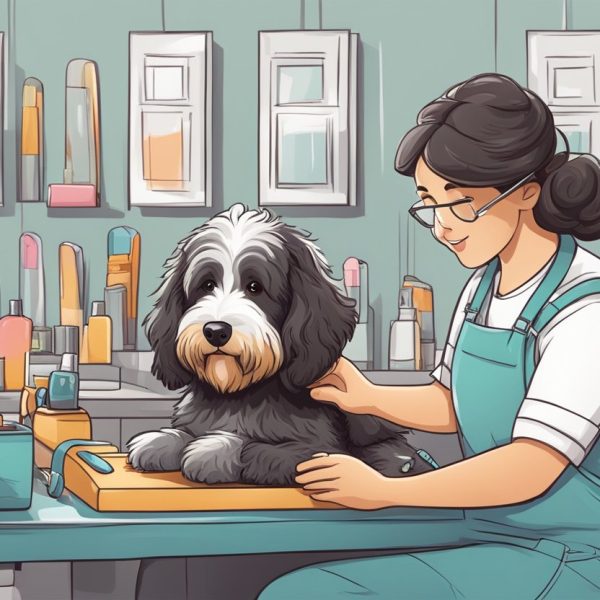Pet healthcare is an ever-evolving field, with new advancements and technologies being introduced regularly. As a poodle owner, you want the best for your furry friend, and it’s essential to stay up-to-date on the latest developments in pet healthcare. In this article, we will explore some of the latest advancements in pet healthcare for poodles that can help keep your pet healthy and happy.

One of the most significant advancements in pet healthcare is the increasing availability of pet insurance. With the rising costs of veterinary care, pet insurance can provide peace of mind and financial protection in case of unexpected illnesses or injuries. Several companies offer pet insurance policies specifically tailored to poodles, with varying levels of coverage and premiums. We will explore some of the best pet insurance options for poodles, including their costs, coverage, and benefits.
Another exciting development in pet healthcare is the growing use of genetic testing to identify potential health issues in dogs. Poodles are prone to several genetic health conditions, such as hip dysplasia and Addison’s disease. Genetic testing can help identify these conditions early, allowing for early intervention and treatment. We will discuss some of the most common genetic health issues in poodles and how genetic testing can help detect and manage them.
Understanding Poodles’ Health Needs
As a poodle owner, it is important to understand the common health concerns that can affect your furry friend. Poodles are generally healthy dogs, but like any other breed, they are susceptible to certain health issues. Here are some key things to keep in mind when it comes to taking care of your poodle’s health:
Regular Veterinary Check-Ups
Regular veterinary check-ups are essential for your poodle’s overall health and well-being. During these visits, your veterinarian will perform a physical exam and may recommend blood work or other tests to screen for potential health issues. It is recommended that adult poodles have a check-up at least once a year, while senior poodles may need more frequent visits.
Proper Nutrition
Proper nutrition is important for maintaining your poodle’s health. Feeding your poodle a balanced and nutritious diet will help ensure that they get all of the vitamins and minerals they need to stay healthy. It is important to choose a high-quality dog food that is appropriate for your poodle’s age, size, and activity level. You may also want to consider adding supplements to your poodle’s diet, such as omega-3 fatty acids or joint supplements.
Exercise
Regular exercise is important for your poodle’s physical and mental health. Poodles are an active breed and require daily exercise to stay healthy and happy. Make sure your poodle gets plenty of opportunities to run, play, and explore. This can be as simple as taking your poodle for a daily walk or playing fetch in the backyard.
Grooming
Grooming is an important part of poodle care. Regular brushing and grooming can help prevent skin irritations, matting, and other issues. Poodles require regular haircuts to maintain their distinctive coat, and it is important to keep their ears clean and dry to prevent infections.
Common Health Concerns
While poodles are generally healthy dogs, there are some common health concerns that can affect them. These include:
- Hip dysplasia
- Progressive retinal atrophy (PRA)
- Addison’s disease
- Bloat
- Epilepsy
By understanding these common health concerns and taking steps to prevent or manage them, you can help ensure that your poodle stays healthy and happy for years to come.
Latest Advancements in Genetic Testing
Genetic testing is an important tool for poodle breeders to help ensure the health and well-being of their dogs. In recent years, there have been several advancements in genetic testing that have made it easier to identify and prevent genetic diseases in poodles. In this section, we will discuss two of the most important advancements in genetic testing for poodles: predictive genetic testing and genetic disease identification.
Predictive Genetic Testing
Predictive genetic testing is a type of genetic testing that can help identify whether a dog is at risk for developing certain genetic diseases later in life. This type of testing is particularly useful for poodle breeders because it can help them identify dogs that are carriers of genetic diseases before they are bred. By identifying carriers early on, breeders can make informed decisions about which dogs to breed and which to avoid, helping to reduce the incidence of genetic diseases in the breed.
One of the most important predictive genetic tests for poodles is the NEwS genetic test, which can help identify dogs that are carriers of the ATF2 gene. The ATF2 gene has been linked to a number of genetic diseases in poodles, including neonatal encephalopathy, which can be fatal in puppies. By identifying carriers of the ATF2 gene early on, breeders can make informed decisions about which dogs to breed and which to avoid, helping to reduce the incidence of these diseases in the breed.
Genetic Disease Identification
In addition to predictive genetic testing, there have also been several advancements in genetic disease identification for poodles. These tests can help identify dogs that are carriers of specific genetic diseases, allowing breeders to make informed decisions about which dogs to breed and which to avoid.
One of the most important genetic disease identification tests for poodles is the MDR1 genetic test, which can help identify dogs that are sensitive to certain drugs. Many herding breeds, including poodles, are sensitive to a number of drugs, and this sensitivity can be fatal if not identified early on. By identifying dogs that are sensitive to these drugs, breeders can make informed decisions about which drugs to avoid when treating their dogs.
Overall, these advancements in genetic testing have made it easier for poodle breeders to identify and prevent genetic diseases in their dogs. By using these tests, breeders can make informed decisions about which dogs to breed and which to avoid, helping to ensure the health and well-being of their dogs for years to come.
Innovations in Nutritional Supplements
If you’re a poodle owner, you know that your furry friend has unique nutritional needs. Fortunately, there have been many recent advancements in nutritional supplements that can help support your poodle’s health and well-being. Here are some of the latest innovations in nutritional supplements for poodles:
Probiotics for Poodles
Probiotics are live bacteria and yeasts that can provide a range of health benefits to your poodle. They can help improve digestion, boost the immune system, and even reduce anxiety. Probiotics work by promoting the growth of good bacteria in your poodle’s gut, which can help keep harmful bacteria in check.
There are many different probiotic supplements available for poodles, so it’s important to choose one that is specifically formulated for your dog’s needs. Look for a supplement that contains a variety of different strains of bacteria, as this can help ensure that your poodle is getting a diverse range of beneficial bacteria.
Specialized Dietary Supplements
In addition to probiotics, there are many other specialized dietary supplements available for poodles. These supplements can help support your dog’s joint health, skin and coat health, and overall well-being. Some of the most popular dietary supplements for poodles include:
- Glucosamine and chondroitin: These supplements can help support joint health and reduce the risk of arthritis.
- Omega-3 fatty acids: Omega-3s are essential for skin and coat health, and can also help reduce inflammation throughout the body.
- Multivitamins: A high-quality multivitamin can help ensure that your poodle is getting all of the essential nutrients it needs to stay healthy.
When choosing a dietary supplement for your poodle, it’s important to look for one that is specifically formulated for dogs. Human supplements may contain ingredients that are harmful to dogs, so it’s best to stick with products that are designed specifically for your furry friend.
In conclusion, there are many innovative nutritional supplements available for poodles that can help support their health and well-being. Whether you’re looking for a probiotic to improve digestion or a multivitamin to ensure your poodle is getting all of the essential nutrients it needs, there’s a supplement out there that can help.
Here’s your requested section:
Progress in Behavioral Health
As veterinary medicine continues to advance, so does our understanding of the importance of behavioral health in pets. For poodles, who are known for their intelligence and sensitivity, behavioral health is especially important. Fortunately, there have been many recent advancements in this area.
Anxiety Reduction Techniques
One of the most important areas of behavioral health is anxiety reduction. Many poodles suffer from anxiety, which can manifest in a variety of ways, including destructive behavior, barking, and even aggression. Fortunately, there are many techniques that can help reduce anxiety in poodles.
One of the most effective techniques is desensitization and counterconditioning. This involves gradually exposing your poodle to the source of their anxiety in a controlled environment while providing positive reinforcement, such as treats or praise. Over time, this can help your poodle learn to associate the source of their anxiety with positive experiences, reducing their overall anxiety levels.
Other techniques that can be effective for reducing anxiety in poodles include:
- Exercise and playtime
- Calming supplements or medications
- Behavioral modification training
- Environmental enrichment
Cognitive Function Enhancement
Another area of behavioral health that is important for poodles is cognitive function enhancement. Poodles are known for their intelligence, but as they age, they may experience cognitive decline, which can lead to a variety of behavioral issues, including confusion, disorientation, and anxiety.
Fortunately, there are many techniques that can help enhance cognitive function in poodles. One of the most effective is cognitive training, which involves providing your poodle with mental stimulation and challenges to keep their minds active and engaged. This can include games, puzzles, and other activities that require problem-solving and critical thinking.
Other techniques that can be effective for enhancing cognitive function in poodles include:
- A healthy diet rich in antioxidants and omega-3 fatty acids
- Regular exercise and playtime
- Environmental enrichment, such as toys and games that encourage exploration and problem-solving
By focusing on behavioral health and utilizing these techniques, you can help ensure that your poodle is happy, healthy, and thriving.
Developments in Physical Health
As pet healthcare continues to evolve, advancements in physical health have made it possible to treat and cure many conditions that were once considered untreatable. Here are some of the latest developments in pet healthcare that can help improve the physical health of your poodle.
Non-Invasive Surgical Techniques
Non-invasive surgical techniques have revolutionized the way veterinarians approach surgery. These techniques involve using smaller incisions, specialized instruments, and imaging technology to perform surgeries with less pain, less scarring, and faster recovery times.
One example of non-invasive surgical technique is laparoscopy, which involves making small incisions and using a camera to perform surgeries such as spaying and neutering. This technique has been shown to reduce pain and recovery time compared to traditional surgery.
Advanced Rehabilitation Methods
Advanced rehabilitation methods have made it possible to treat and manage a wide range of physical conditions in pets. These methods include physical therapy, hydrotherapy, and acupuncture.
Physical therapy can help improve mobility and reduce pain in pets with conditions such as arthritis and hip dysplasia. Hydrotherapy involves using water to provide low-impact exercise, which can be especially beneficial for pets with joint pain or mobility issues. Acupuncture has been shown to be effective in treating a variety of conditions, including chronic pain and neurological disorders.
Overall, these developments in physical health have made it possible to provide better care for pets, and can help improve the quality of life for your poodle.
Emerging Trends in Preventive Care
As the pet healthcare industry continues to evolve, new trends are emerging in preventive care for poodles. These trends are designed to help pet owners keep their poodles healthy and happy for as long as possible.
Vaccination Innovations
One of the most important trends in preventive care for poodles is the development of new vaccination protocols. Advances in veterinary science have led to the creation of vaccines that can protect poodles from a wider range of diseases than ever before. These vaccines are also safer and more effective than previous generations of vaccines.
For example, the Bordetella vaccine has been updated to protect against more strains of the bacteria that cause kennel cough. Additionally, the combination vaccine for distemper, adenovirus, parvovirus, and parainfluenza has been reformulated to provide better protection against these diseases.
Parasite Prevention
Another important trend in preventive care for poodles is the development of new parasite prevention methods. Parasites like fleas, ticks, and heartworms can cause serious health problems for poodles, so it’s important to take steps to prevent infestations.
One of the newest and most effective parasite prevention methods is the use of chewable tablets that contain both flea and tick prevention medication and heartworm prevention medication. These tablets are easy to administer and provide comprehensive protection against these common parasites.
In addition to medication, there are also new preventative measures that can be taken to reduce the risk of parasite infestations. For example, regular grooming can help to remove fleas and ticks from your poodle’s fur, and keeping your poodle away from areas where parasites are likely to be found can also help to reduce the risk of infestation.
Overall, these emerging trends in preventive care for poodles are designed to help pet owners keep their furry friends healthy and happy for years to come. By staying up-to-date with the latest developments in pet healthcare, you can ensure that your poodle receives the best possible care and lives a long, healthy life.
Conclusion
In conclusion, as a poodle owner, it’s important to be proactive and intentional about your dog’s long-term health. Understanding the most common health issues in poodles can help prevent your dog from experiencing a decreased quality of life over their lifetime.
Preventive care and wellness products are becoming increasingly popular in the pet health industry, and rising demand for these products is expected to continue. It’s important to keep up with key trends in the industry to ensure that you are providing the best care for your poodle.
Additionally, the emergence of new pet care product categories is expected to continue, which may provide new options for poodle owners to improve their dog’s health.
Finally, advancements in research, such as the multimillion-dollar gift to the University of Florida Veterinary Oncology Program and Colorado State University from the estate of Lawrence G. Laiks, could be a game-changer in the fight against cancer in animals and humans. As a poodle owner, it’s important to stay informed about the latest research and advancements in pet healthcare to ensure that you are providing the best care for your furry friend.








